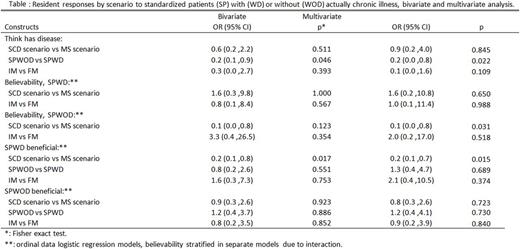Abstract
Standardized patients (SPs) and "objective structured clinical examination" (OSCE) have been utilized to teach medical and allied health professional students how to interview and examine patients for decades. As the adult population of patients with sickle cell disease (SCD) is expected to increase, more care givers will needed. SPs in OSCE settings may be an important training tool for primary care providers to better care for patients with SCD. To assess if SPs with actual chronic disease or actors offer a better learning experience, internal and family medicine resident perceptions during objective structured clinical examinations (OSCE) sessions were evaluated using SPs with and without chronic diseases portrayed. Two case studies focused on complications of SCD and multiple sclerosis (MS). Four SPs were trained about these two chronic illnesses; one each with actual SCD or MS, and one each without. Family and internal medicine residents were randomly asked to examine SPs portraying either SCD or MS without being informed if the SP was with or without the corresponding disease. Residents were asked to complete a 6 item questionnaire: if residents thought the SP had the actual disease based on history, general appearance or physical examination. Likert scale scores assessed believability and how beneficial resident thought SPs with disease (SPWD) or without disease (SPWOD) were. Of the 40 resident assessment included in the analysis, 81.8% (18/22) of residents correctly identified the SPWDs that had actual disease, compared to 50.0% (9/18) of the SPWODs (p=0.046). The believability score for SP portraying SCD was higher for SPWD compared to SPWOD (mean=4.4, +/- 0.7 vs 3.5 +/- 0.9, p=0.032). Amongst residents examining SPWDs, those examining the SP with MS were significantly more likely to say that SPWD were beneficial compared to those examining the SP with SCD (mean=4.7 +/- 0.5 vs 3.8 +/- 0.6; p=0.017). Multivariate analysis is presented in table. This pilot study suggests that resident perception during chronic disease management OSCE may vary depending whether SPs have actual disease, type of disease portrayed and presence or absence of physical findings. A complex chronic disease like SCD may not be easily mimicked even by well-trained actors. Using actual patients may be of benefit even in the absence of overt clinical findings. OSCE may also serve as a research tool to examine, in controlled settings, attitudes of health care professionals towards individuals affected by chronic diseases such as SCD.
No relevant conflicts of interest to declare.
Author notes
Asterisk with author names denotes non-ASH members.


This feature is available to Subscribers Only
Sign In or Create an Account Close Modal